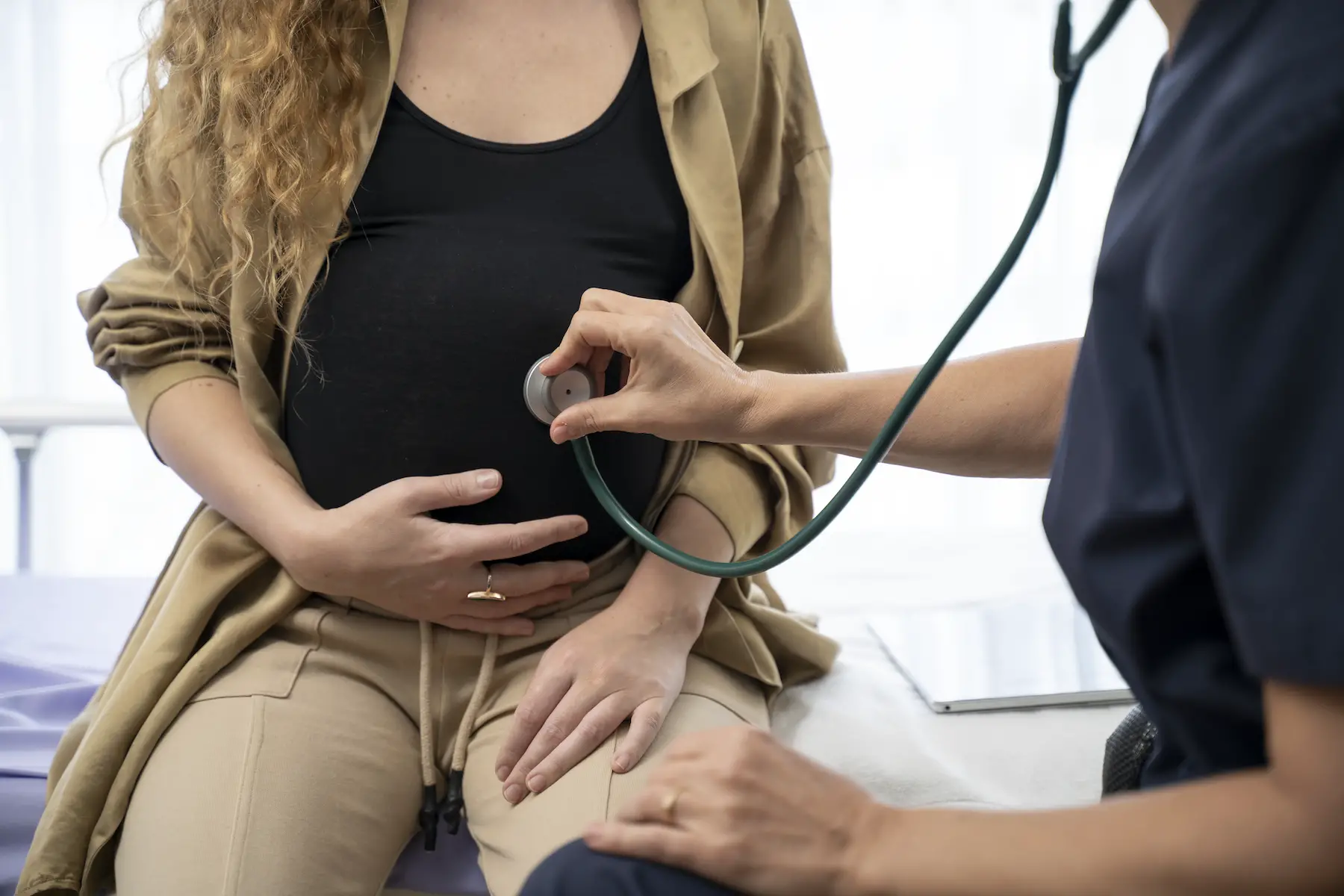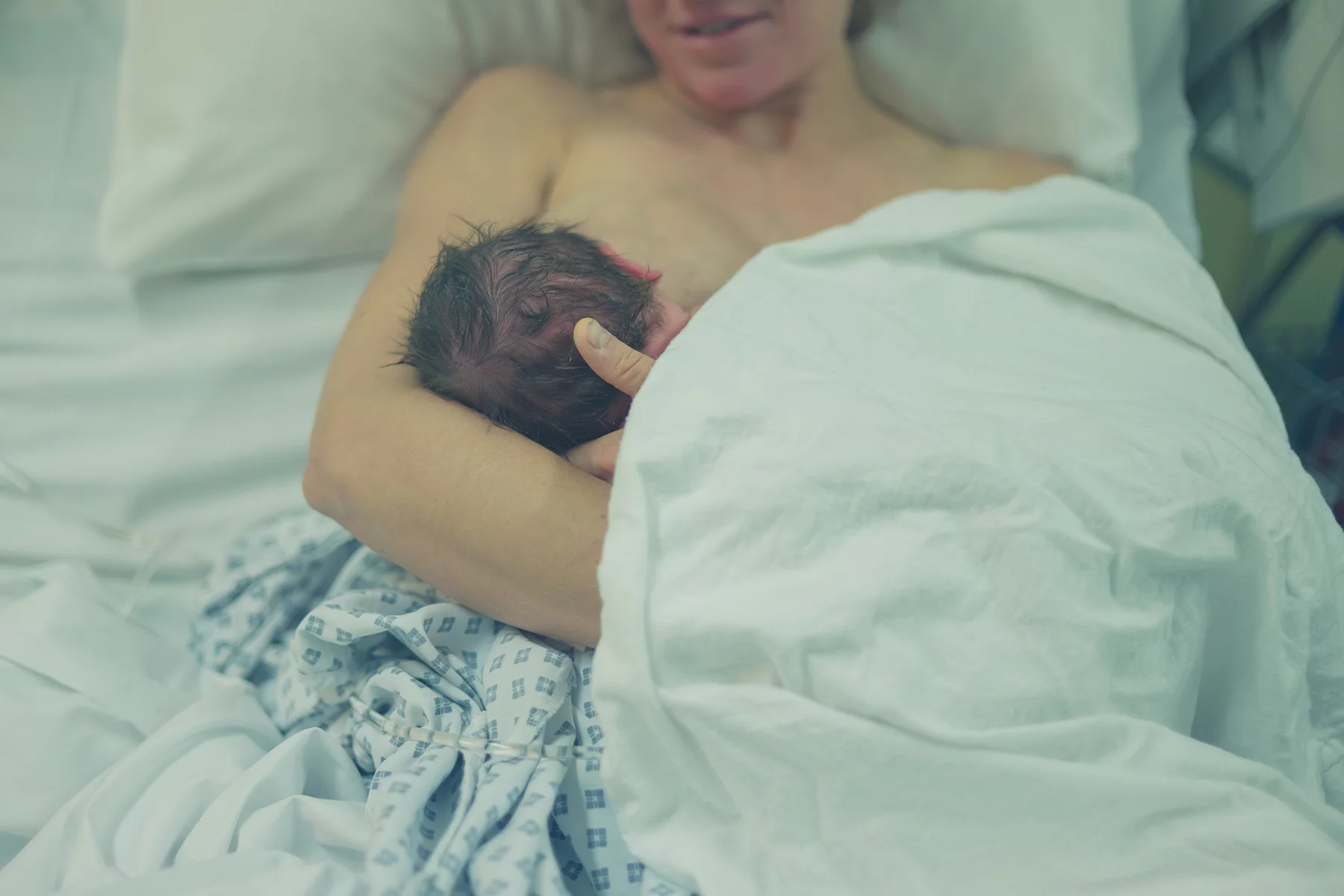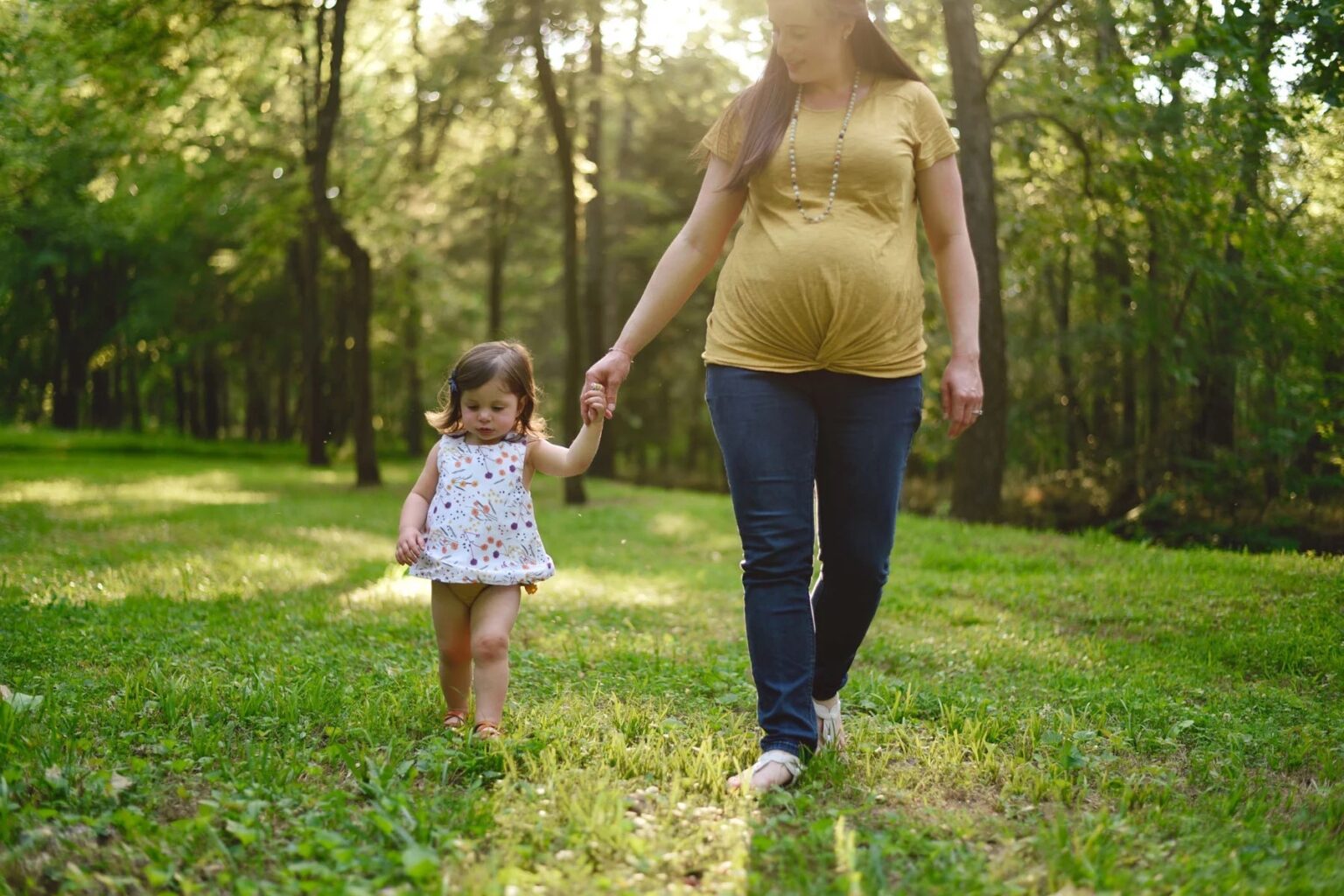Major life milestones, like buying a house, getting married, or starting a family, can seem daunting when you live outside your home country. After all, there are a lot of logistics for internationals to consider, from health insurance coverage to social security benefits. If you plan on having a baby in Germany, you’ll be pleased to know that the country has a top-tier healthcare system, and pregnant patients are cared for every step of the way.
Read on for more about pregnancy and childbirth in Germany, including:
- Giving birth in Germany
- Accessing German maternity services
- German maternity costs
- Pregnancy tests in Germany
- Prenatal care in Germany
- Giving birth in Germany
- Postnatal care in Germany
- Registering a birth in Germany
- Non-residents and tourists having a baby in Germany
- Parental leave in Germany
- Child benefits in Germany
- Helpful German vocabulary about pregnancy
- Useful resources
Cigna Global
Want access to the best private medical services in Germany? Speak to the healthcare professionals at Cigna Global today and find a policy that’s right for you. Take advantage of their global network of doctors, specialists, therapists and more with coverage tailor-made for you and your family. If you’re starting a new life in Germany, get peace of mind with Cigna Global.
Giving birth in Germany
Nearly 800,000 babies were born in Germany in 2021, with a total fertility rate of 1.58 children per woman. The average age of a mother at the time of her first birth is 30.5 years. 2021 also saw a record low in the number of marriages and a record high in births across Germany – the highest since 1997. The German government attributes some of this increase to the COVID-19 lockdown period.

Pregnant patients can give birth in a hospital, birth house, or at home, with all three options covered by health insurance. Anyone living in Germany will need to register with either a public or private health insurance scheme for maternity coverage.
If you’re employed in Germany and paying into the social security scheme, you may claim parental leave for up to three years after the baby’s birth. There are also other benefits available once you have a baby in Germany, such as monthly child allowance.
After delivering a baby in Germany, it’s important to arrange your newborn’s registration and apply for a birth certificate. A child born in Germany or to German parents can claim citizenship if they meet certain conditions.
Accessing German maternity services
In Germany, both state-funded and private health insurance schemes cover an annual visit to the gynecologist (Frauenarzt) for every woman over the age of 20. If you’re pregnant or think you might be, you can go to the same gynecologist you see each year or choose a different one, and either will be covered.
Internationals living in Germany have equal access to maternity services as long as they’re signed up with public or private insurance. Short-term visitors and tourists should have global health insurance coverage during their stay in Germany. Those from the European Economic Area (EEA) or Switzerland can use their European Health Insurance Card (EHIC) to access maternity services.
German maternity costs
Your state German health insurance will typically cover the basic costs of pregnancy and childbirth. You may, however, find additional costs for some of the paperwork associated with giving birth. If you choose a private hospital, check what your health insurance covers and what costs you must incur for the baby’s delivery and care. It may be worth taking out a private insurance policy if you’d rather not give birth in a public hospital
Some of the largest private health insurance companies in Germany, called Krankenkassen, include:
Since having a baby can be very expensive, German public insurance companies grant parents a bonus of €100–300 at the time of birth.
Pregnancy tests in Germany
Think you might be pregnant? In Germany, you can get a home pregnancy test (Schwangerschaftstest) from most supermarkets or pharmacies (Apotheke). In major cities, you can even find them in vending machines at common public places, like train stations.
Most home pregnancy tests have an accuracy rate of about 98% starting from the first day your period is due. There are also tests that work earlier – ask a pharmacist for more information.

If you have a positive result at home, your gynecologist can then do a more accurate blood test. Like home tests, these also look for the beta hCG hormone which is more easily detectable in blood. In most cases, your doctor will need to prescribe the lab work for insurance to cover it.
Prenatal care in Germany
The main point of contact during your pregnancy in Germany is the community midwife, who coordinates arrangements on your behalf with a larger team of general doctors, obstetricians, and other hospital staff. The midwife is the person who will arrange your prenatal appointments and tests.
Prenatal appointments
Your community midwife can arrange a prenatal appointment for your visit to the hospital consultant. At this appointment, you complete the hospital registration process, which usually takes around 45 minutes. This is important as it allows you to go straight to the maternity unit when the time comes to give birth in Germany.
Parents-to-be can visit the hospital as part of a scheduled tour of the maternity unit (Entbindungsstation). During this, you’ll get the opportunity to visit the delivery suite. You’ll also meet with the hospital midwives and medical staff and can ask any questions you might have about childbirth.
Healthcare professionals will record your and your baby’s progress on a maternity record (Mutterpass). This will have details of each medical appointment. The Mutterpass is an important document to bring with you to each appointment and to the hospital or birth house on delivery day.
Scans, tests, and checks
Typically, pregnant patients see their gynecologist every four weeks or so until the end of the second trimester. At these visits, a doctor or midwife checks blood pressure, and takes a blood and urine sample. These tests include checking blood groups and Rh factors (for both mother and baby), immunity against rubella, toxoplasmosis, and gestational diabetes. However, not all insurance policies cover every type of test; it’s worth checking both with your doctor and insurance company.

Women with German state health insurance will be offered three ultrasound scans throughout their pregnancy. Doctors must discuss the advantages and disadvantages of ultrasounds before carrying them out, and you have a right to refuse these scans.
The first scan, carried out between the 9th and 12th week, confirms that you are indeed pregnant, checks for the baby’s heartbeat, and gives a rough due date. The second, between weeks 19 and 22, and the third, between weeks 29 and 32, also measure the fetus’ head, belly, and thigh while determining the position of the placenta. Women may also be offered extensive ultrasound procedures, which are usually not covered by insurers without an explicit medical reason.
Vaccinations during pregnancy
Vaccines are not mandatory in Germany, but some are recommended especially for pregnant women. These include the seasonal flu vaccine, whooping cough (pertussis), and COVID-19 booster.
More about vaccinations in Germany is available at the Robert Koch Institut, whose STIKO committee sets the national recommendations each year.
Prenatal classes
It’s common to begin birth preparation classes by the 25th week or so. In Germany, the Dick-Read Method is popular, which prioritizes relaxation to minimize pain during childbirth. However, Lamaze, yoga, partner sessions, and other breathing technique classes are also available.

German state health insurance now covers birth preparation courses for fathers, too. Your midwife is a good point of contact for specific classes in the nearby area.
Giving birth in Germany
People having a baby in Germany can choose to give birth in a hospital, birth house, or at home. Health insurance covers all the options. Depending on where you live, you may have a wider variety of available options.
Home births and birth houses
If you’ve decided on a home birth (Hausgeburt), a midwife will come to your house when the time comes. Home births are growing in popularity across Germany and are mainly appropriate for pregnancies with few complications. In case of an emergency during home birth, you’ll transfer to a hospital.
A birth house (Geburtshaus) is between the home environment and the hospital. They provide a comfortable atmosphere managed by midwives but offer more services than you’d have at home. Most birth house delivery suites have a bed and a bathtub so that you can have a water birth (Wassergeburt). Many also offer outpatient treatments, allowing you to leave within a few hours of giving birth. There are no emergency services on site, so they’ll call an ambulance in case of complications.
Hospital births
Hospitals and clinics offer epidurals and deal with emergency services, making them the best option for high-risk pregnancies. Midwives typically handle the birth process, but doctors step in should there be any complications.
Typical hospital stays last three nights, or five for C-sections. Maternity wards have two to four beds, with bathroom facilities on the same floor. Many German hospitals offer family rooms at an extra charge, where your partner or companion can stay overnight.
If you have the time, it can help to phone ahead to the delivery suite (Kreißsaal). Although not necessary, it lets them know you are on your way. When you arrive, you must give your Mutterpass to the hospital midwife, who will confirm your arrival and registration. You can also advise the medical staff of your birthing preferences if these aren’t in your maternity record.
Bringing a few personal items will make your stay more pleasant and comfortable. You will need to bring your own nightclothes, dressing gown, slippers, and personal toiletries, including towels. However, the hospital will provide clothes for the baby. You may also wish to bring books or magazines to help you relax during your hospital stay.

You should be aware that in Germany, hospitals will ask for the baby’s name soon after birth. This differs from some other countries where parents have time after the baby is born to think of a name.
You may find that nurses appear not to be checking on you regularly. However, this is because rest is valued in German hospitals, and nurses expect to be called by patients if help is required. Therefore, feel free to use the bedside call system.
Postnatal care in Germany
Generally, after having a baby in Germany, mothers stay in hospitals for up to five days after the birth. Nurses and midwives support mothers with their newborn babies, including help with breastfeeding or bottle feeding and general care.
Vaccinations
Infants and young children are offered a number of vaccines in Germany starting shortly after birth. These include:
- Tetanus
- Diphteria
- Whooping cough or pertussis (combined as DTP)
- Haemophilus influenzae b (Hib)
- Polio (poliomyelitis)
- Hepatitis B
- Pneumococcus (Streptococcus pneumoniae)
- Rotavirus
- Meningococcus C (Neisseria meningitidis)
- Measles, mumps, rubella (MMR)
- Chickenpox
Nurseries and childcare
There are a wide range of childcare options in Germany, but costs and availability vary. Typically, nanies care for children up to 3 years old, either in home or in a private nursery. Since 2013, children 12 months and older have a legal right to a childcare place, partly subsidized by the state. Children aged 3 to 6 are also entitled a place in a German preschool, known as kindergarten, and some after-school clubs. School-aged children (6+) have the additional option of wrap-around care at school, although not all institutions provide this.
Registering a birth in Germany
You must register your newborn within one week at the Standesamt (registry office) in the town where you gave birth. You can do this yourself; otherwise, your midwife, the baby’s father, your doctor, a relative, or a friend can also register the birth. If deemed necessary, an official from the registry office may visit the maternity ward to register your child while still in the hospital.

The registration office will require confirmation of the birth (provided by the doctor or midwife). This is called a Geburtsbescheinigung in German. They may also ask for a copy of the parents’ birth and marriage certificates (some may ask for a translated version).
Multiple copies of the Geburtsurkunde (birth certificate) will be made available to you so you can arrange child benefit and health insurance for your child. Your child’s birth certificate will also be used for arranging identity cards, a passport, and registration at nurseries and schools.
If you want an international birth certificate, you can get this at the Standesamt for the same fee in French, German, or English.
Non-residents and tourists having a baby in Germany
Tourists in Germany must have health insurance or be prepared to pay for medical expenses out of pocket. European Union (EU) citizens are covered under German state healthcare by providing their EHIC.
However, non-residents and tourists applying for a Schengen visa must take out a travel insurance policy with a coverage value of up to €30,000. Anyone who doesn’t need to apply for a visa in advance should take out a travel insurance policy – particularly if they’re planning to stay for a few months.
Some travel insurance policies cover pregnant women in the first trimester, but coverage rarely extends beyond that period without an add-on component. The average uninsured birth costs upwards of €1,500 depending on the facilities, and €2,500–5,400 for a C-section.
It’s worth considering a global travel insurance policy if you’re pregnant and planning a short stay in Germany. Some international health insurance providers include:
In emergencies or life-threatening situations, you can call the free emergency number 112. The call center will send either an ambulance, police, or firetruck.
Will your child get German citizenship?
A baby is registered German by birth if they were born to at least one citizen, irrespective of whether the child was born in the country or abroad. If neither parent is a citizen, a child born in Germany automatically takes German nationality provided that at least one parent has been living in the country for eight years, is Swiss, or has permanent residence.
Parental leave in Germany
After a baby is born in Germany, the parents have a right to take up to three years of parental leave (Elternzeit) from work. Unlike maternity and paternity leave, which automatically begin around the birth of a child, you must apply for parental leave.
The Elterngeld (parental allowance) payment ranges from a minimum of €300 to a maximum of €1,800 per month, or 65–100% of your normal salary. Higher paid employees usually receive 65% and low earners can get up to 100%. This benefit lasts for one year, but can be extended to 14 months if the second parent stays at home for at least two months. The aim is to allow both parents to take time off.
The German government has also introduced the ElterngeldPlus package with the aim of helping parents who work part-time following the birth of their baby.
German maternity leave
Women who give birth in Germany receive 14 weeks of paid maternity leave. This is broken into six weeks before the expected birth date and eight weeks after delivery.

Employed women who are covered by private insurance rather than the statutory scheme need to claim maternity benefits directly through the Federal Office for Social Security (Bundesamt für Soziale Sicherung – BAS).
Paternity leave in Germany
While there is no state-mandated, fully-paid leave specifically for fathers in Germany, most employers classify the day of the birth as a holiday. Fortunately, the EU passed a directive in 2022 requiring all EU countries to give two weeks of paid paternity leave. Germany is expected to enact this new law by 2024.
Child benefits in Germany
In Germany, parents receive a monthly benefit amount of €250 for every child under the age of 18. You should apply for these benefits after the baby is born. For more information on child benefits in Germany and to find your local office, visit the Bundesagentur Fur Arbeit (Federal Agency for Work).
Bear in mind that having a child will also affect your tax status – for help with your German tax return, it’s worth checking out online services such as Taxfix or Wundertax.
Helpful German vocabulary about pregnancy
- Pregnancy test: Schwangerschaftstest
- Abortion: Abtreibung/Schwangerschaftsabbruch
- Birth: Geburt
- Health insurance: Krankenkasse
- Ultrasounds/Sonograms: Ultraschall/Ultraschallaufnahmen
- Birth preparation classes: Schwangerschaftsvorbereitung
- Due date: Geburtstermin
- Mother’s pass/pregnancy book: Mutterpass
- Hospital: Krankenhaus
- Midwife: Hebamme
- Nurse: Krankenschwester
- OB/GYN: Frauenartz
- Head doctor: Chefarzt
- Delivery room: Kreissaal
- Cesarean section: Kaiserschnitt
- Forceps: Forzeps/Zange
- Push: Pressen
- During labor: Geburtsverlauf
- I want an epidural-anesthesia: Ich möchte die Epidural-Anaesthsie
Useful resources
- Midwives in Germany – search for midwives in your area
- Abortion and family planning – helpful information on sexual health, contraception, and pregnancy
- Federal Ministry for Family Affairs, Senior Citizens, Women and Youth – government agency that handles child and family social security programs
- Federal Employment Agency







